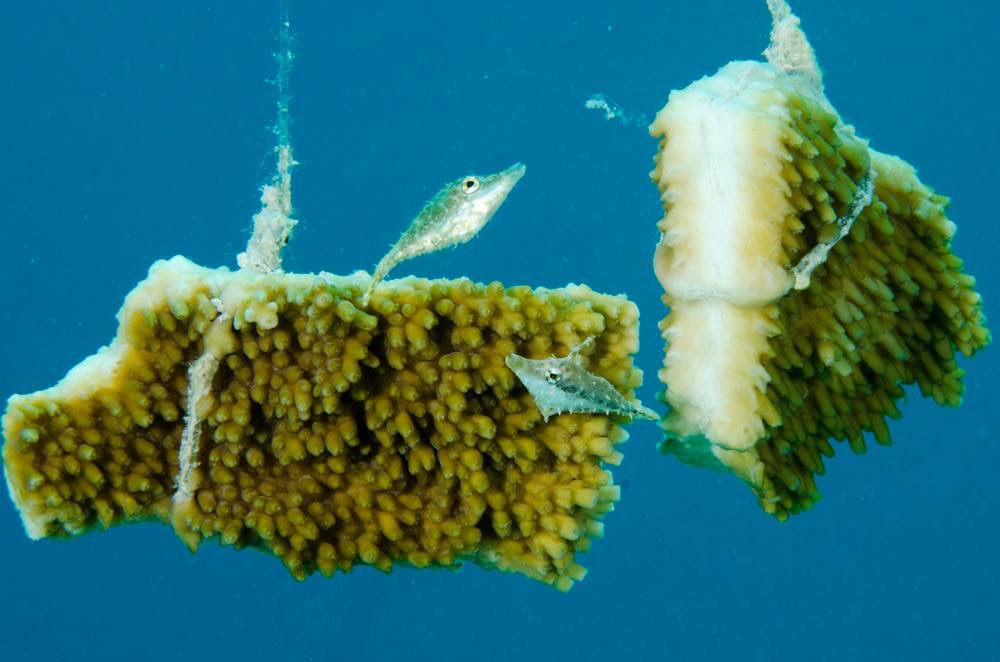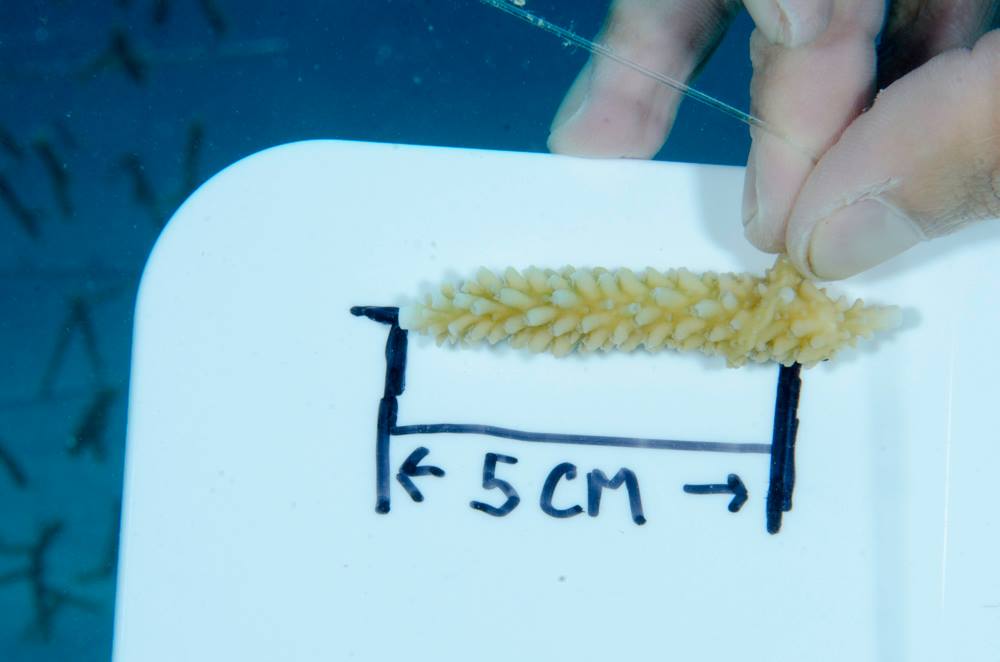Marine Life & Conservation
Cayman’s Coral Nursery Program Launched with High Hopes
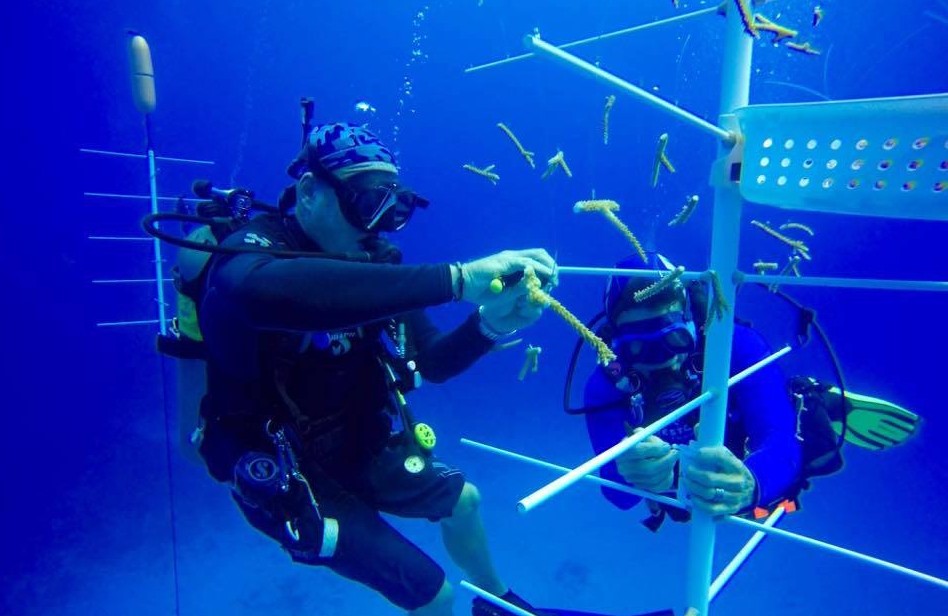
After only a few short weeks, hundreds of coral fragments hanging from “trees” made of PVC pipe in the shallow waters of Grand Cayman are showing healthy signs of life and attracting fish. Ocean Frontiers, Sunset House and Divetech are gardening coral that will be used to replenish Cayman’s reefs. The Cayman Islands Department of Environment granted the operators permits to set up the coral nurseries and is overseeing their individual programs.
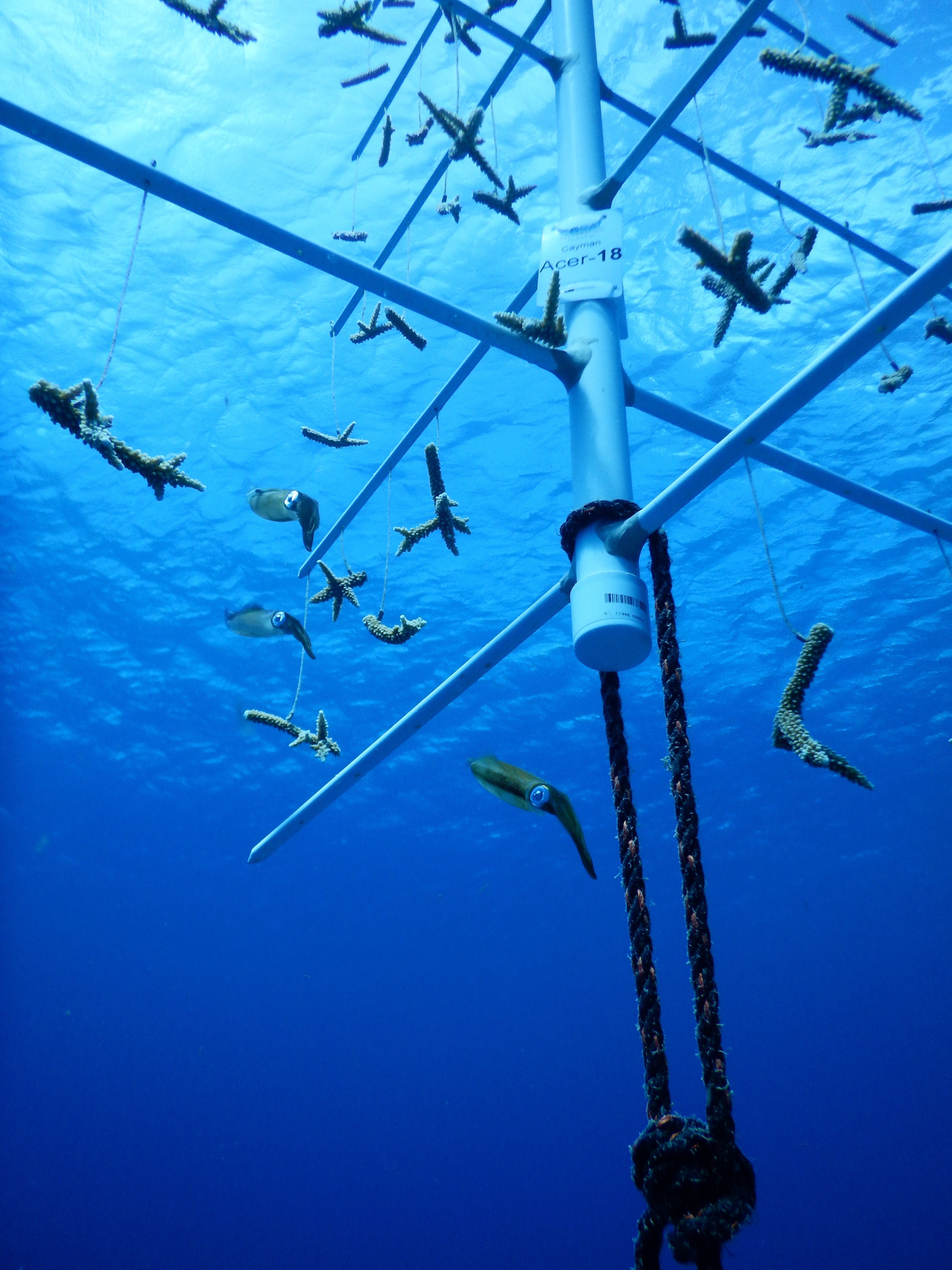 “So far everything looks great! There has been zero mortality from the collected coral,” says Lois Hatcher who is managing the nursery for Ocean Frontiers. “We are doing weekly maintenance on the site and setting up a report for the Department of Environment. The fragments are being monitored for disease, photographed and measured. They already show visible growth after just a few weeks.”
“So far everything looks great! There has been zero mortality from the collected coral,” says Lois Hatcher who is managing the nursery for Ocean Frontiers. “We are doing weekly maintenance on the site and setting up a report for the Department of Environment. The fragments are being monitored for disease, photographed and measured. They already show visible growth after just a few weeks.”
The coral trees were set up in late April with the help of Sea of Change Foundation, an ocean conservation non-profit that donated money and materials to construct the PVC trees, plus guidance and manpower. Experts from the Coral Restoration Foundation were brought in to help install the trees and train the dive operators in how to manage the nurseries.
“Every year the Foundation picks a project that we believe will make a difference in saving our seas, and this year we picked Cayman’s coral nursery program,” said board member Jerry Beaty. “We’ve seen this method succeed in other places and because Cayman is such a prime dive destination, we want to do what we can to keep it that way.”
Each coral tree, which can hold about 100 coral fragments, is anchored to the sea bottom with rope and can float with the currents, even during storms and hurricanes. The coral fragments feed from the nutrient-rich currents and they grow. Cayman’s nurseries contain fast-growing Staghorn Corals. Nursery tenders clean and maintain the coral trees to find the strongest corals which will then be used to “seed” local reefs.
“I was out cleaning the nursery the other day and everything looks very healthy and all of the fragments have already grown over the fishing line that is attaching them to the trees. Very exciting!” says Jo Mikutowicz, Divetech.
“The staghorn has already grown between .5 cm to 2.5 cm based on the 5 cm baseline fragments that were hung. On the Elkhorn it’s great to see the mono that was wrapped around the fragment as they have overgrown already,” said Lois Hatcher.
The Sunset House coral nursery has attracted a small school of curious squid.
“The nursery is doing very well, and there’s also a lot of interest from guests,” says General Manager Keith Sahm. “The trees are strategically placed and depth changeable to accommodate the nursery, and keep it safe from a late season Nor’wester.”
Dive operators, staunch advocates for protection of the marine environment, have always enforced conservation measures to reduce the stress on Cayman’s reefs from divers. The chance now to be directly involved in growing coral to seed and boost the reefs is exciting and fills them with purpose.
“It requires a lot of work on Divetech’s part to maintain the coral trees weekly, to keep algae off of them and keep any predators (snails and fire worms) off the coral,” explains Jo Mikutowicz. “We are very dedicated to this nursery program being a success and will put in all the work that is required to maintain them.”
With coral reefs threatened worldwide from overfishing, rising water temperatures, ocean acidification, pollution and more, Cayman’s operators are excited about the good things that will result from their new coral nurseries.
“It sometimes seems like there is a lot working against coral to stay alive and be healthy these days so it’s nice to finally be able to be proactive in reversing the damage to the reefs and to be able to create new reefs,” said Mikutowicz.
“It will be very successful, there is no reason for it not to be,” says a confident Lois Hatcher, who has co-managed the successful coral restoration project in George Town Harbour started a year ago to repair reef damage from a ship anchor.
“At the Carnival Magic site we have out planted already and those are doing well. Cayman reefs will never be the same as they were 100 years ago or even 20 years ago but we can slow down and maintain the loss which means there is hope. As long as there is hope we need to continue,” she said.
Marine Life & Conservation
Leading UK-based shark conservation charity, the Shark Trust, is delighted to announce tour operator Diverse Travel as a Corporate Patron

 Corporate Patrons provide a valuable boost to the work of The Shark Trust. The Trust team works globally to safeguard the future of sharks, and their close cousins, the skates and rays, engaging with a global network of scientists, policymakers, conservation professionals, businesses and supporters to further shark conservation.
Corporate Patrons provide a valuable boost to the work of The Shark Trust. The Trust team works globally to safeguard the future of sharks, and their close cousins, the skates and rays, engaging with a global network of scientists, policymakers, conservation professionals, businesses and supporters to further shark conservation.
Specialist tour operator Diverse Travel has operated since 2014 and is committed to offering its guests high quality, sustainable scuba diving holidays worldwide. Working together with the Shark Trust will enable both organisations to widen engagement and encourage divers and snorkellers to actively get involved in shark conservation.
“Sharks are truly at the heart of every diver and at Diverse Travel, we absolutely share that passion. There is nothing like seeing a shark in the wild – it’s a moment that stays with you forever!” says Holly Bredin, Sales & Marketing Manager, Diverse Travel.
“We’re delighted to celebrate our 10th year of business by becoming a Corporate Patron of the Shark Trust. This is an exciting partnership for Diverse and our guests. We will be donating on behalf of every person who books a holiday with us to contribute towards their vital shark conservation initiatives around the world. We will also be working together with the Trust to inspire divers, snorkellers and other travellers to take an active role – at home and abroad – in citizen science projects and other activities.”
Paul Cox, CEO of The Shark Trust, said:
“It’s an exciting partnership and we’re thrilled to be working with Diverse Travel to enable more divers and travellers to get involved with sharks and shark conservation. Sharks face considerable conservation challenges but, through collaboration and collective action, we can secure a brighter future for sharks and their ocean home. This new partnership takes us one more valuable step towards that goal.”
For more information about the Shark Trust visit their website here.
For more about Diverse Travel click here.
Marine Life & Conservation
Shark Trust Asks Divers to help with Shark Sightings this Global Citizen Science Month

 Whether you are stuck for ideas of what to do with the kids or are off on the dive trip of your dreams. You can get involved in Citizen Science Month and help the Shark Trust by providing vital data about sharks are rays both close to home and further afield.
Whether you are stuck for ideas of what to do with the kids or are off on the dive trip of your dreams. You can get involved in Citizen Science Month and help the Shark Trust by providing vital data about sharks are rays both close to home and further afield.
In addition to reporting the sharks and rays you see on your dives, the eggcases you find on the beach, the Shark Trust is looking for some specific data from divers who are asked to report any Oceanic Whitetip and Basking Sharks.
Oceanic Whitetip Sharks
The Shark Trust are looking specifically for Oceanic Whitetip Shark sightings over the coming weeks and months. So, if you are diving anywhere in the world, please report your sightings via the website or app.
Website: https://recording.sharktrust.org/
App: Search The Shark Trust in your app store
The Oceanic Whitetip. Known for their incredibly long dorsal and pectoral fins, this species was once the most abundant oceanic-pelagic species of shark on the planet.
Large and stocky, they are grey or brown above, and white below and famous for their huge rounded first dorsal fin and paddle-like pectoral fins. The fins also highly prized within the shark fin trade. Whilst they are mostly solitary, Oceanic Whitetips do occasionally hunt in groups.
An inquisitive species, they were easy prey for fisheries. Combined with their low reproductive rate, they were inevitably at high risk of population depletion. And declines of up to 99% have been reported in certain sea areas. They are listed as Critically Endangered on the IUCN Redlist (2019).
Conservation efforts to discourage further declines include listing on CITES Appendix II and CMS Appendix I. They’re also the only species prohibited from take by all the Tuna RFMOs (Regional Fisheries Management Organisations). However, these measures do not mean that Oceanic Whitetips are not still caught – whether targeted or as bycatch – in some parts of the world. With populations declining at such a high rate, effective implementation of management measures is essential to ensure that the species can recover.
If you are lucky enough to get an image of an Oceanic Whitetip and you record your sighting on the Shark Trust app or website YOU CAN WIN! All images submitted with sightings, that also give consent to use in conservation messaging, will be in with a chance to win an Oceanic Whitetip T-shirt and mug. The competition will run until the end of “Shark Month” in July – so keep those sightings (and images) coming in.
Basking Sharks
Basking Shark (Cetorhinus maximus) season is upon us, and the Shark Trust is asking everyone to keep an eye out for these majestic giants over the summer months. If you see any, you can record your sighting to the Basking Shark Sightings database.
Each year, these mighty fish return to British waters to feed on plankton. You may see one, (or a few if you’re really lucky) from around April-October. They can be seen feeding at the surface of the water, where they look like they’re basking in the sun. Thus, their name!
Sighting hotspots around the British Isles include southwest England, Isle of Man, north coast of Ireland, and western Scotland. The Sea of the Hebrides is the most prolific sightings area in Scotland, but they have been spotted all around the coast and have even ventured into some of the sea lochs. The Shark Trust has received thousands of sightings since the Basking Shark project began, but more data is needed to truly understand what is going on with population numbers and distribution. You can help by recording your sightings this summer.
Great Eggcase Hunt
The Shark Trust has an Easter Egg Hunt with a difference for you to try. Take part in the Great Eggcase Hunt and get involved with a big citizen science project that helps shark, ray and skate conservation. And it’s an enjoyable activity for all the family.
The Shark Trust also want snorkellers and divers to record their underwater eggcase findings. Underwater records help pinpoint exactly where sharks and skates are laying their eggs and can help link to beach records. Learning the depth and substrate that they lay on also helps better understand the species.
Find out more: https://www.sharktrust.org/great-eggcase-hunt
Whether you are diving, snorkelling or exploring on the beach you can take part in Citizen Science Month and get actively involved in shark and ray conservation. Find out more: www.sharktrust.org
-

 News3 months ago
News3 months agoHone your underwater photography skills with Alphamarine Photography at Red Sea Diving Safari in March
-

 News2 months ago
News2 months agoCapturing Critters in Lembeh Underwater Photography Workshop 2024: Event Roundup
-

 Marine Life & Conservation Blogs2 months ago
Marine Life & Conservation Blogs2 months agoCreature Feature: Swell Sharks
-

 Blogs1 month ago
Blogs1 month agoMurex Resorts: Passport to Paradise!
-

 Gear News3 months ago
Gear News3 months agoBare X-Mission Drysuit: Ideal for Both Technical and Recreational Divers
-

 Blogs2 months ago
Blogs2 months agoDiver Discovering Whale Skeletons Beneath Ice Judged World’s Best Underwater Photograph
-

 Gear Reviews2 months ago
Gear Reviews2 months agoGear Review: Oceanic+ Dive Housing for iPhone
-
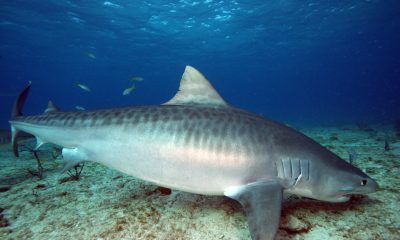
 Blogs3 months ago
Blogs3 months agoThe Thrilling Encounter with Tiger Sharks at Beqa Lagoon’s ‘The Colosseum’ with Coral Coast Divers


